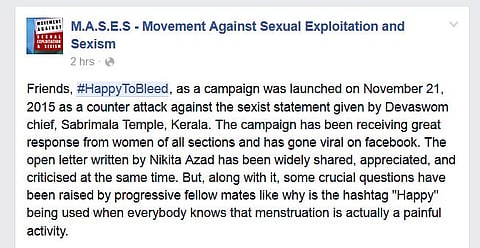

When the head of the Travancore Devaswom Board, the body in charge of Sabarimala Ayyappa temple, came out and said that women could be permitted to enter the temple when a machine to check whether it was the ‘right time’ is invented, a number of women and men criticised his views.
Facebook group Feminism in India began the #Happytobleed event and hashtag, in which women hold up sanitary napkins or signboards saying they are happy to bleed.
Some men too held up similar posters but with captions that said “in solidarity with #Happytobleed”.
#HappyToBleed #SmashPatriarchy Arjun Unnikrishnan, Co-founder Let's Talk About Menstruation pic.twitter.com/sGQX7RSJsu
— Countercurrents.org (@Countercurrents) November 22, 2015Some men just said they supported the campaign
My solidarity with #HappyToBleed its the source of life. Stop stigmatism.
— Shinoj Raghavan (@rshinoj) November 23, 2015It hasn’t gone viral, but the Happy to Bleed campaign has definitely made its presence felt on both Twitter and Facebook and has got people taking a stand on the notion that menstruation is “impure”. Some women, while supporting the idea, said that menstruation was not a happy time for them.
Others criticised the campaign for being nothing but attention-grabbing tactics.
.@FeminismInIndia,what are you trying to prove;you don't care a fish abt God,temple or edicts; just want to show contempt with #HappyToBleed
— Rasita (@rasita) November 23, 2015The campaign follows an article by Nikita Azad for Youth Ki Awaaz called ‘A young bleeding woman’ pens an open letter to the keepers of Sabarimala temple. A comment on the story by Ayyappa Devotee talked about why the temple did not allow women.
The user said that the Sabarimala temple was one of four Ayyappa temples which constitute the worship of the Dharmashasta deity. Only the Sabarimala temple barred women’s entry because it symbolised Ayyappa’s Brahmachari stage. The user said that a devotee had to observe certain rules for 41 days (but did not mention why specifically that number of days).
After this point, the explanation sort of veers off into a mansplanation on how women would only distract a man from his “great attempts to control his mind (as sexual urges do happen and are very normal too. This is exactly the way nature has built us)”.
Sabarimala temple authorities however, have maintained that the temple’s denial of entry for women had nothing to with menstruation-related ‘impurity’, but said that certain rules had to be observed for the presiding deity who was celibate.
Speaking to The News Minute on Monday, activist and member of the Sabarimala tantri family Rahul Easwar evaded a direct answer on the question of supposed impurity of menstruation.
He denied that the president of the Travancore Devaswom Board Prayar Gopalakrishnan had talked of a machine to scan for ‘impurity’.
“Devaswom Board chairman did not mean it the way the media portrayed it, he only spoke about appropriate times" he said.
Asked whether appropriate meant menstruation, Easwar did not answer. To a question on the campaign which had sprung up around Gopalakrishnan’s remarks, Easwar said “Why can’t people understand that it’s tradition? It is not gender discrimination. Hinduism gives importance to women. Every religious institution has its customs which have been followed for hundreds of years. Even the Kerala High Court and Supreme Court have upheld these customs.”
The debate continues.